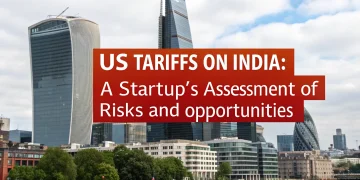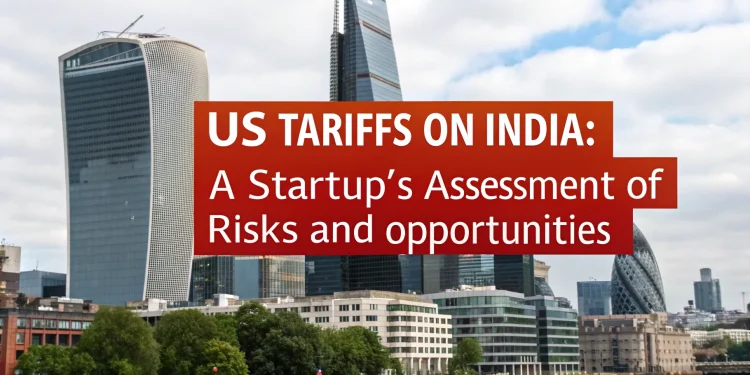Until now, the US Tariffs on India have impacted multiple sectors of trade. Startups and business leaders in India face a paradoxical situation where traditional sectors burdened by exports stagnate and lose competitiveness in the US market. However, a greater innovation urge, along with the need to identify new niche global and domestic markets, presents Indian entrepreneurs with unprecedented opportunities.
In the subsequent lines, I shall detail which sectors have borne the worst brunt, where entrepreneurs should shift their focus to, and the sectors that promise the next wave of industrial opportunities.
The Affected Sectors of Indian Exports
In the leather and textile sectors, Indian entrepreneurs have always been considered competitive suppliers. Other segments of Indian exports that have been impacted include manufacturing exports of chemicals, metals, and some engineering commodities, which India has always excelled in. Subsequently, Indian exporters face a greater burden of tariffs, which gives a competitive edge to suppliers from Vietnam, Bangladesh, and Mexico.

Related: The $323 Million Opportunity: How Indian Exporters Can Dominate the Essential Oils Market
Industries Most Affected by U.S. Tariffs
Textiles and Apparel
The textile and apparel industry in India, which forms a considerable part of the country’s exports to the U.S., is grappling with shrinking margins and a dip in competitiveness. This industry is losing its competitive advantage with a market size of over $40 billion.
Leather and Footwear
The exports of leather and footwear products from India, which stand at $5 billion a year, are facing the brunt of the impact. With the rise in tariffs, Indian products become expensive, and U.S. consumers shift to other sourcing alternatives.
Steel and Metal Products
Indian manufacturers of specialty steel and rolled metal products face tariffs that impact domestic producers of the U.S. infrastructure and automotive industry.
Chemicals and Dyes
Small and medium-sized manufacturers of organic and specialty chemicals in Gujarat and Maharashtra are particularly impacted due to the higher tariffs placed on certain specialty chemicals and organic compounds.
Engineering Goods
With regards to engineering goods that encompass automotive parts and other machinery, there is an impediment in the U.S. market, which reduces demand from MSMEs and supporting industries.
Statistical Overview of the Impact
• Exports of textiles and apparel account for almost 28% of India’s export merchandise to the U.S.
• Exports of leather and footwear are pegged at $5 billion, with over 20% of that coming from the U.S. market.
• The value of engineering goods exported by India was close to $10 billion during the last fiscal year to the U.S.
• Exports of chemicals are estimated at $22 billion, a significant proportion of which encounter non-tariff barriers.
• Exports of steel to the U.S constitute 15% of India’s steel exports, which impacts the domestic steel manufacturers.
View our Books for more information
Exempt and Resilient Sectors
Essential raw materials, as well as pharmaceuticals and IT services, are shielded from tariffs and provide some relief to the export economy. India’s pharmaceutical exports to the U.S are projected at 25 billion and IT services exports at over 50 billion a year. Many of these sectors are and will remain unscathed and continue to expand, showing resilience against disruptions due to tariffs.
Related: Import US Tariffs & Strategies for Indian Exporters
Opportunities For Entrepreneurs
Even if some areas of work are restricted, there are still positive aspects emerging that are inviting to Indian entrepreneurs and startups, including:
• Suited to replace imports of goods that will no longer be competitively priced from the U.S.
• Shift focus to export markets in Europe, Africa and the ASEAN region.
• Allocating capital to emerging sectors such as technical textiles, vegan leather, and agrochemicals which are environmentally friendly.
• Utilize trade in services and global markets to sell goods free from traditional trade barriers.
How NPCS Guides Entrepreneurs Through Tariff Issues
We at NPCS offer consulting services regarding the preparation of Market Survey cum Detailed Techno-Economic Feasibility Reports (DPR) for new industries or businesses, NPCS offers specialized consulting for the preparation of Market Survey cum Detailed Techno-Economic Feasibility Reports (DPR) for new industries or businesses. Our reports contain:
• Detailed manufacturing process
• Market research and demand analysis
• Process flow diagrams
• Product mix and capacity planning
• Machinery and raw materials
• Detailed project financials
We aid entrepreneurs with the evaluation of the industrial projects for feasibility, profitability, and scalability.
New Opportunities Across Sectors
Specialty Chemicals: Due to the imposed tariffs on the exports of chemicals, there is an opportunity for startups to cater to the local industries as well as penetrate the Asian and African markets. There is potential for capturing the specialty chemicals market as it is growing at a rate of 9-10% CAGR.
Technical Textiles: While the traditional apparel market is experiencing a decline, the medical, construction, and automotive apparel technical textiles are witnessing a surge. Along with the country’s demand, the government’s financial support gives a great opportunity for new businesses.
- Green alternatives in leather: Entrepreneurs can take advantage of the growing demand for vegan and plant-based leathers by creating sustainably sourced leather alternatives.
- Agribusiness and Food Processing: The agrochemicals sector still benefits from exempt tariffs. The food processing and export business has a sustained opportunity owing to global demand for organic and ready-to-eat food products.
- Digital and E-commerce Trade: E-commerce has provided a starting point for many aspiring entrepreneurs. With Amazon Global and Alibaba, business owners now have the option of creating global brands.
For more information, check out our related videos
Inspiration from Indian Business Tycoons
Entrepreneurship in India has persistently faced and overcome disruption. The country’s top business tycoons have shown us how flexible, innovative, and resilient leadership can transform challenges into opportunities:
• Mukesh Ambani (Reliance Industries): Leading the charge in the diversification into telecom and digital services.
• Ratan Tata (Tata Group): Became a household global brand with a focus on innovation and acquisitions.
• Kiran Mazumdar-Shaw (Biocon): Established India as a global biotechnology hub through affordable and high-quality services.
• Uday Kotak (Kotak Mahindra Bank): Provided insight on how strategic investment combined with risk management can enable resilient profitablity.
Discover the Right Business for You With Our Startup Selector Tool
Conclusion
The U.S. Tariffs have both advantages and disadvantages when looked at from an Indian exporter’s perspective. Exporters from India in the fields of textiles, leather, chemicals, and other labor-intensive sectors lose their competitive edge. The good news is that this is a good moment for startups and other new business ventures. They can now seek new untapped areas of trade, innovate by introducing eco-friendly substitutes, and play to India’s strengths to transform this trade loss into success stories.
With the right direction from NPCS, the relevant market information, and the vision of India’s business leaders, Indian entrepreneurship can look forward to a brighter and tougher tomorrow.


















